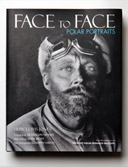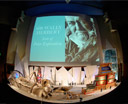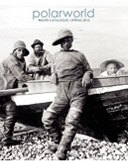 Our ProductsOur Resources |
This website requires the free Flash plugin to be installed.
Polarworld - discover more polar booksThe Arctic Book Review Lady Franklin's Revenge: Lady Franklin's Revenge: A True Story of Ambition, Obsession, and the Remaking of Arctic History Ken McGoogan Reviewed by Russell A. Potter Ken McGoogan's prodigious output of the past few years — including biographies of Dr. John Rae and Samuel Hearne — has certainly added a significant chapter to the popular interest in Arctic explorers of past centuries. Particularly with Fatal Passage, his book on Rae, McGoogan succeeded in restoring lost credibility and credit to an unjustly neglected figure, and his passion for his subject inspired a book which energetically attacked the old myths and misunderstandings which had obscured our view of Rae's accomplishments. His book on Hearne was less successful, partly on account of the far slimmer historical documentation available — Hearne's life story is full of gaps, which McGoogan could not resist filling in with imagined dramatic scenery, a habit which was very pointedly criticized in these pages. Without the sense that Hearne had in some way been slighted, the fires of outraged justice had little fuel, and without ample documentation, McGoogan had difficulty restraining his fervent imagination. These faults are largely absent from Lady Franklin's Revenge, in which McGoogan seems to have regained his footing on the icy territory of nineteenth-century Arctic drama. In many ways, Lady Franklin was the nemesis of Dr. Rae, and in bringing the villain of his former narrative to life, McGoogan once again has a subject he truly cares about, though in this case his role is as much critic as champion. And yet, curiously, even as McGoogan makes a feint of lowering our opinion of Lady Franklin by exposing her role in developing the official fictions of her famously lost husband, he soon finds himself admiring the woman he ostensibly set out to discredit. He tries to maintain his original judgment, but is eventually confounded by the very web of heroism he has set out to untangle. This, curiously, has the effect of heightening the drama, with the reader in many places rooting for Lady Franklin as though she were struggling with the author herself. Her ladyship eventually wins the battle, just as she did back at the height of the Franklin drama, and by the end, McGoogan makes his peace with her. In between, we are treated to a lively and dramatic recounting of the life of a remarkable figure, one who grew from a young woman whose combination of shyness and pride had led her friends and family to assume she would never marry, to the most famous widow in the world, a woman The Times of London would dub "Our English Penelope." McGoogan gives us the most detailed and thorough account yet penned of Jane Griffin's life before she married her Arctic hero, including a compelling reconstruction of how her friendship with the doomed Eleanor Ann Porden, whose marriage to Franklin — in so many ways her opposite — puzzled all her friends, Jane Griffin not the least of them. Here, with fairly detailed correspondence and diaries as his guide (Jane was a compulsive diarist) McGoogan adds just the right degree of intelligent conjecture and inference when needed. We can see the gradual, and at first unexpected, feelings that Jane had for Franklin, including perhaps just a tinge of jealousy at his marriage to Eleanor (Jane took the occasion of their wedding to embark on one of her numerous trips abroad). It's a far more vivid portrait of this time than any previous biographers have managed, including Martyn Beardsley in his own recent biography of Franklin. It comes, therefore, as no surprise when Jane, on Franklin's return from his successful second land expedition, finds the soon-to-be "Sir" John on her doorstep; the implication is that she has arranged things rather conveniently, and knew precisely how to draw forth the somewhat dunderheaded Franklin into her snares. McGoogan, I think, underestimates John Franklin, a man who if he was (pace Sten Nadolny) somewhat "slow," was nevertheless gifted with enormous patience and persistence. That Jane had found a mate who would bow to her wishes was only part of the truth; she had also hitched her wagon to a (Northern) star, a man whose quiet strength and determination were very much akin to her own. McGoogan follows Jane through the early years of their marriage, during which Sir John was posted to the Mediterranean, and Jane undertook her first — and remarkably ambitious — travels. I for one was surprised to realize how widely she traveled, and for how long, crisscrossing Tunisia, Malta, the Holy Land, and Egypt, and remaining abroad long after her husband returned to England in search of a new posting. Jane's independent streak was a strong one, and as McGoogan points out, as a married woman with a famous husband, she in fact enjoyed far greater freedom of movement than she would have as a spinster. In a chapter somewhat misleadingly entitled "A Romantic Interlude," McGoogan details Lady Franklin's boat–trip up the Nile with Rudolf Lieder, a Euopean missionary charged with disseminating Protestantism on the periphery of Empire. Clearly Lady Franklin was fond of Lieder, and may indeed have enjoyed the ever-so-slightly scandalous picture they made ascending the Nile in two boats with dozens of servants and boatmen. Yet, aside from a moment in a storm when Lieder did his best to keep Lady Franklin and her notorious iron four-poster bed from sliding about the cabin, and a gap — suggestive but inconclusive — in her Ladyship's journals and correspondence, there's no evidence of any such affair. That Lady Franklin, on her return to England, collapsed into her bed for two weeks is readily explained by McGoogan's own larger portrait of Jane as a woman who travelled abroad to escape the restrictions of conventionality at home. Despite this and a few other unnecessarily purple passages, McGoogan is at his best when the blanks he needs to fill are more modest, and to his credit he never neglects to note when the evidence is uncertain, or the testimony based on potentially apocryphal accounts. His strongest suit of all is his ability to find the dramatic center of a complex intrigue, which he applies to great advantage in untangling the uneasy years when Franklin was appointed governor of Van Diemen's Land. I've read numerous accounts of this tumultuous time, and McGoogan's not only makes the battle-lines clear, but brings forth a good deal of hitherto-neglected materials. Even if one is an admirer of Franklin, one has to smile at the insulting epithets a group of rebels from Upper Canada — blissfully unaware of the symbolic function Franklin would later have for their nation — hurled at the man who welcomed them to his penal colony. To them he was "the governor of the Land of Nod," "an enormous mass of blubber and wind" whose head was "chucked down between his shoulders, for the wise provision, no doubt, of shortening the esophagus." McGoogan gives a lively account of the slow destruction of Sir John's credibility by John Montagu, his dissembling Colonial Secretary, punctuated by quite engaging recapitulations of Lady Franklin's forays into local travel and exploration. He draws upon Penny Russell's account of Jane's cross-Australian journey to Sydney, but his account of her trans-Tasmanian excursion — the only one of her ventures on which she was accompanied by Sir John — is novel, and rich in well-drawn characters. McGoogan's description of Jane's copiuous tears as she worried over the plight of some of their stranded porters — all of them transported convicts — gives us a convincing portrait of a significant broadening of the sensibilities of a woman who, despite her spirited resistance of traditional feminine roles, was at heart quite politically conservative. Most readers will, by this point, be anxious to get on with the Arctic bits, and McGoogan obliges them, using the visits of James Clark Ross to Van Diemen's land on his way to and from the Antarctic as a segue. The strength of Ross's friendship with Jane is made clear here, as is the back-story on the disappointing courtship of Jane's neice Sophy Cracroft by Frances Crozier, Ross's second–in–command. McGoogan would have it that Sophy rejected Crozier in favor of her beloved aunt, but despite the lurid prose, it's eminently clear that the devoted attachment between these two women was not at all about sex. Rather, McGoogan might have observed, it had to do with Sophy's desire to live the same kind of life as her aunt without the inconvenient appendage of a husband, in which end the younger woman proved to be entirely successful. Sophy might indeed have made a stronger figure here, although McGoogan, when he does describe her, brings her quite vividly to life — her own words do so, whenever they are quoted. Back in England, fiercely working to save her husband's reputation, Jane got right to work, lobbying in Parliament and at the Admiralty (though always, as McGoogan reminds us, through intermediaries) for Sir John to be given the command of the new Arctic expedition being contemplated by Sir John Barrow. For a woman who was on familar terms with almost everyone — Lady Jane had, for instance, known Benjamin Disraeli's family since he was a child — this was no great difficulty. With James Clark Ross, Franklin's only real rival for the post, firmly in her camp, Lady Jane achieved her goal through the kind of indirect peristence that she had honed to perfection back in Tasmania. McGoogan here is re–telling a well-known tale, but he does so quite capably, giving a fresh insight into Lady Franklin's role in almost every matter, from Parliamentary rewards to the selection of men to command the search parties. Nothing, it soon becomes apparent, happened without Jane's planning, notice, or (dis)approbation — often all three. The drama of the Franklin search has rarely been so well–recounted, though McGoogan's occasional twists and turns in the chronology of events may leave the unititated a little breathless. Especially moving is his account of her commissioning of M'Clintock's expedition, although one can almost hear the author hissing through his teeth as he recounts the achievments of that noted navigator. Adjectival epithets — the "peerless Rae" vs. the mediocre M'Clintock — abound, but despite it all, McGoogan really does manage to mete out justice to both parties, and thankfully spares us any lengthy recapitulation of his Rae hagiography. Lady Franklin herself, for whom McGoogan begins to show increasing sympathy and imagination, is not overly blamed for her rejection of Rae's accounts — after all, who would want to give ear to accounts which implicated one's husband in acts of cannibalism and depravity? The insertion of several passages in which McGoogan imagines Jane digesting, and ultimately accepting, Hall's corroboration of Rae's account, is somewhat gratuitous, but does not really harm the underlying history. What we have, in the end, is a deeply engaging and really quite moving account of a widow's fierce fight for her late husband's reputation. Yet this section of the book, compelling as it is, is undercut by numerous errors of fact, some slight and some significant, and all annoying. On p. 215 he refers to the notorious pile of food tins left behind on Beechey Island as if they were still full ("obviously inedible"), whereas it's well-known that they were empty of food, and had been re–filled with stones (it's hard to understand the lead poisoning argument given here if one imagines the food was never eaten). Discussing the recovery of HMS Resolute by a whaling captain, McGoogan mistakenly names the captain Hartstene (in fact it was James Buddington), using the name of the naval officer who commanded the vessel months later. He then complicates the error further by stating that "the whaler left his own ship to be retrieved the following year" — hardly a very sensible idea (in fact, Captain Buddington left half of his crew aboard his own ship, which was also piloted back to New London). Charles Francis Hall's account of Inuit testimony on mutilated and cannibalized bodies is said to be from his "soon–to–be–published book Life With the Esquimaux," whereas in fact that book had been published years earlier and contained no such testimony (the Inuit accounts of cannibalism appeared in Hall's second book, published posthumously under the editorship of Nourse). Finally, and most irritatingly, one of the book's emotional climaxes is blunted by the misquoting of Lady Franklin's own epitaph on the Franklin memorial at Westminster Abbey; the actual monument reads: THIS MONUMENT WAS ERECTED BY JANE, HIS WIDOW, WHO, AFTER LONG WAITING, AND SENDING MANY IN SEARCH OF HIM, HERSELF DEPARTED, TO SEEK AND FIND HIM IN THE REALMS OF LIGHT. For some unaccountable reason, McGoogan gives the text as "REALMS OF LIFE" — ruining the lovely metaphorical condensation of the Arctic with heaven, and adding another to the sad catalog of misread Arctic memorials. Such errors undercut the authority of the book, and although most readers will not notice them, might make anyone familiar with the Franklin expedition a bit suspicious about the care with which facts have been checked in other parts of the volume. It is to be hoped that they may be corrected before the book is published in the United States or — at least — before any paperback edition. Nevertheless, despite such issues, Lady Franklin's Revenge remains an extraordinarily gripping book, and the best portrait we have had to date of the life of a woman who, whatever her faults, was by far the most compelling and durable figure in the great age of Arctic exploration. |
|
||
follow us  | join us | join us  | home | contact | home | contact
|
||||
|
© Copyright Polarworld Ltd
SiteWizard.co.uk Web Site Design Company |
||||


